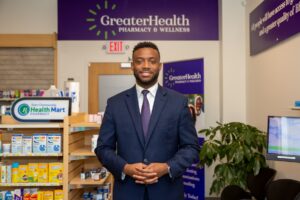A new Black-owned pharmacy startup in St. Louis will use a business model that combines the services Walgreens and Amazon provide to combat the pharmacy desert crisis that affects low-access communities.
GreaterHealth Pharmacy & Wellness offers free delivery and telehealth services across the St. Louis Metropolitan area, helping to eliminate pharmacy deserts for over 45,000 residents. Those in underserved areas can receive pharmacy services directly at home within minutes of making a call, and this would ensure timely access to essential medications and health care support.
The initiative comes as Black and brown communities have seen a string of pharmacy closures, including some situated within Walgreens and Rite Aid locations, that were essential for meeting local health care demands. The closures worsen the prevalence of pharmacy deserts in these areas, limiting access to essential health care services.

Pharmacy deserts refer to regions lacking accessible pharmacies within a square mile (or a square half-mile radius for individuals facing transportation challenges). Limited pharmacy access exacerbates chronic health conditions and escalates health care expenses. Countless individuals nationwide are affected by pharmacy deserts, with Black and Latino communities bearing the most significant burden.
Founder and CEO Dr. Marcus Howard emphasized how GreaterHealth and other community pharmacies could help bridge the gap by providing accessible health care services.
“To make pharmacy more accessible in pharmacy deserts we are first bridging the trust gap and second, we are making it more convenient by offering free medication delivery and telehealth options,” Howard said in a news release.
GreaterHealth Pharmacy & Wellness is committed to alleviating St. Louis residents’ challenges in accessing essential services. The company delivers to city residents free medication, over-the-counter products, and fruits and vegetables. It also provides virtual telehealth services, including medication education, health screenings, and care coordination, benefiting Medicaid-covered individuals who lack transportation and are at high risk for medication adherence issues. These efforts aim to improve health care accessibility and outcomes in communities.
